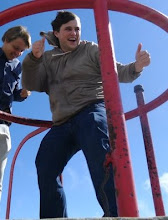We may be pushing the limits of how we develop the land. It seems to be that land developers may be getting too greedy and neglecting the dangers of shaping the land to meet their desires for building houses and collecting money from homeowners. Recently in Hercules, CA on the east side of the SF Bay, 8 homes have been condemned due to a waterlogged hill sliding down and destroying retaining walls abutting the properties. We see this all too often: Homes in California, built against steep hillsides, taken down and demolished after the rainy season slickens the soil and causes land and mudslides. Who can't recall seeing pictures on the news of multi-million dollar hoems in Malibu falling into the sea, and landslides covering hillside developments?
I think its time we take a look at how little we care about the land we are building on and using, and be mindful of where we develop. Building homes should be about the environment you are entering, not how much money a young professional couple is willing to plunk down in turn for a cookie cutter box on a steep hillside. Maybe we should look at more responsible, denser development. Clean, green apartment buildings that use less energy per square foot than massive homes that suck up Air Conditioning expenses every single day. Look at the city of Vancouver: often ranked in the top 5 best cities to live in, most of its residents live in high-rise apartment buildings with gleaming blue reflective glass, passive heating systems, and short, simple commutes.
Where would you rather live?
It's become so bad in the states that now China, who is fast on track to overtake the US in economic development, is building massive American-style subdevelopments made of multi-thousand square foot homes that suck up almost as much energy as American homes. We shouldnt be leading by this example. I say we should make an effort to ditch the suburban sprawl and create a more energy-efficient city-based society. That way, we can return the once sprawling farmland back to its original status, and bring people closer together, cut down on driving, increase productivity, and create a better energy society. Thats what i want.
Wednesday, March 30, 2011
Landslides in California Should Serve as a Warning
Labels:
consumers,
development,
ecology,
energy efficiency,
green,
news,
wealth



18 comments:
true words
Hell, I'd work on a farm if I had the money to live otherwise. Also, robot farm laborers would be a pretty funny concept
i think the crappy state of the economy might finally push whoever is in charge to back energy efficient tech. it just a matter of time
I moved out of the city to a more suburban/rural area, and definitely miss the city for all it's benefits in terms of mass transit, less resource use, and convenience of things. That said, it takes a lot of energy to run a city, especially a clean one...
This is true, ironchef, but overall per capita the energy use is less than the modern american suburb, especially when you factor in the drop in automobile use
very true.
American Suburbinization needs to stop, or at least slow down. Suburbs not only take up huge tracts of land, but they facilitate more automobile use which leads to more pollution. I would love to see more compact living, public transportation, and high speed rail connecting all these communal nodes together. The land in between the cities can be given back to nature in the form of parks or used for agriculture.
I'd live in a city if it didn't suck ass. Suburbia, here I come! For those of you that like the suburbs as well, don't buy your house if its on some dirt hill. You shouldn't need a geologist to tell you that.
~H. Coct
Isn't Cali supposed to just slide off the continent? :)
Better energy efficiency is the only way we're going to advance in society, and that starts in the labs at MIT and CalPoly
Hey Darkkal,
We definitely have the technology ready to go, but the demand is still low in the US for responsible energy efficient vertical living. The market is still dominated by the upper 1% of people living in Chicago, New York, and Miami who can afford million dollar condos in the first green high rises that we're building. one day I hope to see cities spring up with middle-income housing in new energy-efficient apartment buildings
They've dug up the mountains around here and there are some sides that have absolutely no "grounding" by plants roots, and that are ready to erode... Some people just don't consider the consequences.
San Francisco just had a huge amount of rain. I'm not surprised a few houses washed away.
Interesting news regarding the recent storms in the bay area. I've been to Vancouver, and there's trees everywhere. It has to be the cleanest big city I've ever seen.
If you are interested in this stuff, look up Venus Project. They are a bit autistic towards the politics of the world, but isn't every great scientist? :D
Man I'm glad I don't live in a place that has landslides. That fucking sucks.
I'd rather live in a smaller town, where it isn't too crowded. But you make a valid point. I'm just afraid to be too separated from nature.
I used to live in the northern bay area in a house on stilts in the side of a hill. Never. Again. I was always scared of it coming down. But I live in the east bay now and a few houses this year were on the news for being damaged by landslides because of the rain. Oh, and this one guy on the news wanted the government to pay for his porch because it got broken off and slide down the hill.
Post a Comment